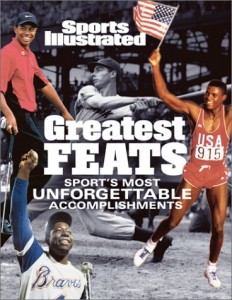 The other day in a used book store, I came across a copy of a Greatest Feats: Sport’s Most Unforgettable Accomplishments. Turning through the pages, I was reminded of Bible characters who could fit the categories employed in the book:
The other day in a used book store, I came across a copy of a Greatest Feats: Sport’s Most Unforgettable Accomplishments. Turning through the pages, I was reminded of Bible characters who could fit the categories employed in the book:
1. Classic Performances: The authors listed Tom Dempsey’s first-ever 60-yard field goal; Roger Bannister’s 4-minute mile; Pele’s staring role in Brazil’s first World Cup championship; and Jesse Owens’ stunning medal sweep at “Hitler’s Olympics.” On the Bible side, David’s defeat of Goliath, Elijah’s besting the prophets of Baal on Carmel, Esther’s rescue of her people, and Stephen’s convicting sermon and martyrdom stand out.
2. Spectacular Seasons: The book honored the Miami Dolphins’ perfect season, Babe Ruth’s 61-home-run summer, and Manchester United’s “treble” (Premier League; European Cup; F.A. Cup). In Scripture, the early reign of Solomon was dramatic, attracting admiration from around the region, prompting a visit from the Queen of Sheba; it was a season of prosperity and spiritual renewal, including construction of the Temple.
3. Legendary Streaks: In the sports realm, we think of UCLA’s string of national basketball championships, where John Wooden coached such luminaries as Lew Alcindor (Kareem Abdul Jabbar) and Bill Walton. Then, looking to both the Old and New Testaments, we see literary streaks, such as the collection of Psalms David wrote and the sweep of Luke/Acts, penned by Dr. Luke. We might also think of David’s run of victories against the Philistine enemies of Israel, a record which embarrassed Saul and made him jealous.
4. A Lifetime of Excellence. Among the sports legends in this category are Hank Aaron, who broke Babe Ruth’s career home run record, Richard Petty, who was “King Richard” of the NASCAR track, Jack Nicklaus, whose record of major tournament wins still stands, and Rod Laver, who won two tennis Grand Slams (Wimbledon, US, French, Australian) seven years apart.
As for biblical characters, some stood out as exemplary from beginning to end—the long-suffering prophet Jeremiah and the apostles John and Paul. Some biblical figures shown bright, but, unlike Paul, they stumbled dramatically (e.g., David and Bathsheba; Peter and the Judaizers).
While a few of the sports greats covered in this book gave God credit for their talents and performance (e.g., Nolan Ryan), the vast majority didn’t (e.g., Cal Ripken), though, of course, God was the ultimate source of all their accomplishments. In contrast, the heroes and heroines of the Bible were keenly aware of God’s provision and claim on their lives. Facing the giant Goliath, David shouted, “You come against me with a dagger, spear, and sword, but I come against you in the name of Yahweh of Hosts, the God of Israel’s armies”—and then predicted victory, because “the battle [was] the Lord’s” (1 Samuel 17:45-47).
While we can celebrate the athletic achievements of sports heroes, whose accomplishments are far beyond our ability, we can study the lives of the saints in Scripture, confident that the same God who empowered them for the daunting tasks before them is our God as well. Of course, we can admire the “classic performances” of Athanasius at the Council of Nicaea and Luther at the church door in Wittenberg, and the “lifetime achievements” of William Wilberforce and Billy Graham. But we should also celebrate the Christian businessman who models integrity and shows genuine love for his employees, the doctor who leaves his comfortable practice to bring healing to a region rife with Ebola, and a high school senior who remains chaste and sober in the face of enormous peer pressure. These too are great feats, though the bulk of the applause may come from heaven.